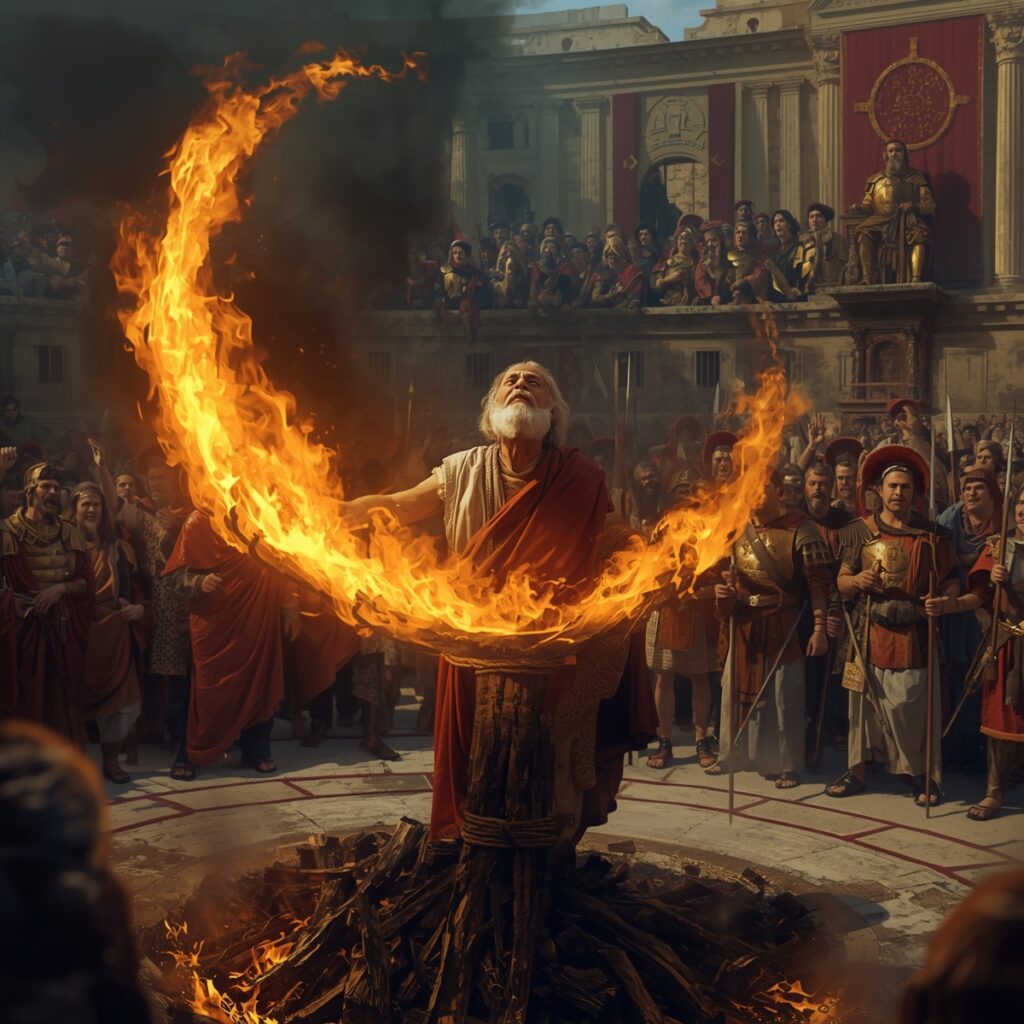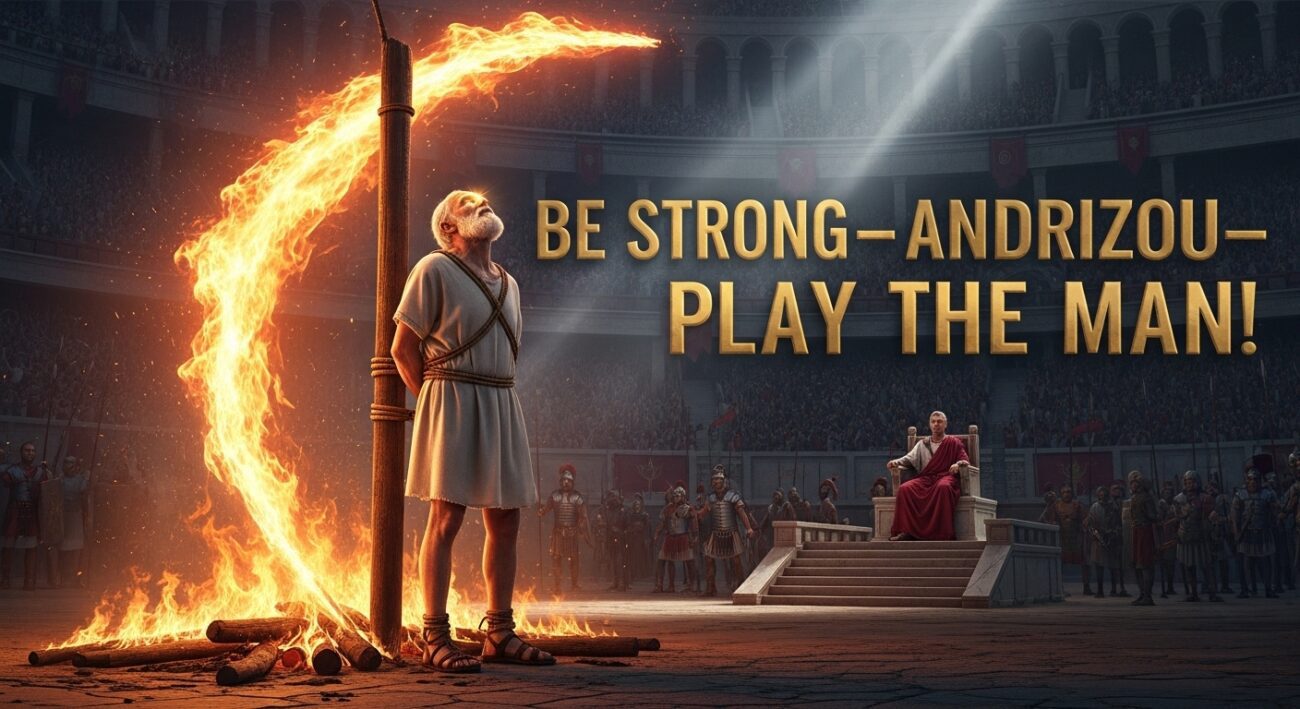Introduction: Polycarp’s Courageous Stand
In an era of compromise, the story of Polycarp, bishop of Smyrna, resonates with a clarion call to unyielding faith. Around AD 155, this disciple of the Apostle John faced death for refusing to deny Christ. His story, marked by the divine charge—“Be strong, andrizou, play the man!”—offers timeless lessons for Christians navigating modern pressures. This article explores Polycarp’s martyrdom, his bold words to the Roman authorities, and how his example urges us to embody Christ-like courage.
Andrizou – Be Strong
“Be Strong—Andrizou—Play the Man! Polycarp’s courage calls ALL believers—men and women—to fight like soldiers in battle (1 Timothy 6:12). His bold rebuke to the Emperor warns against ‘easy-believism’—faith without costly obedience. Jesus said, ‘Whoever denies me before men, I will deny before my Father’ (Matthew 10:33). He challenges us to reject compromise and embrace faithful endurance.

The Historical Context of Polycarp’s Martyrdom
Polycarp (c. AD 69–155) was a pivotal figure in the early church, mentored by the Apostle John and revered as bishop of Smyrna (modern Izmir, Turkey). In the Roman Empire, emperor worship demanded loyalty, clashing with Christian devotion to Jesus as Lord. By AD 155, under proconsul Statius Quadratus, Polycarp became a target. The Martyrdom of Polycarp, a letter from the Smyrnaean church, records his trial and death, offering a vivid account of his steadfastness.
When soldiers found the 86-year-old bishop hiding in a farmhouse, he welcomed them with hospitality, offering food and praying for two hours—moving even his captors to tears. Led to the stadium, Polycarp faced a roaring crowd, fresh from the execution of eleven believers. Amid the chaos, a heavenly voice declared, “Be strong, Polycarp, and play the man!” (andrizou, Greek for “act like a man” or “be courageous”), echoing biblical calls to fortitude (Joshua 1:9; 1 Samuel 4:9).
Polycarp’s Defiant Words to the Emperor
As the proconsul urged Polycarp to swear by Caesar’s genius and curse Christ, the bishop stood firm. With unwavering conviction, he declared, “Eighty-six years have I served Him, and He has done me no wrong. How can I blaspheme my King who saved me?” Then, facing the pyre prepared for him, Polycarp delivered a chilling rebuke to the authorities: “This fire you kindle will consume me in an hour, but for you, the fire you will enter burns forever in hell.” This bold warning, rooted in the biblical reality of eternal judgment (Matthew 25:41; Revelation 20:15), underscored Polycarp’s fearlessness and his certainty in Christ’s ultimate victory.
Miraculously, when the flames were lit, they formed a vault around Polycarp, sparing him immediate harm, reminiscent of Daniel’s companions in the fiery furnace (Daniel 3:19–27). A sweet aroma, like frankincense, filled the air, testifying to God’s presence. Only when a soldier pierced his heart did Polycarp’s life end, his blood quenching the flames. The church hailed him as a victorious athlete, echoing Paul’s words: “I have finished the race” (2 Timothy 4:7).
Theological Insights: Manhood as Faithful Endurance
Polycarp’s story unveils a profound truth: Christian manhood is not about cultural bravado but sacrificial fidelity to Christ. The term andrizou calls believers—men and women—to embody courage akin to a soldier in battle (1 Timothy 6:12). In a post-apostolic era rife with Gnostic heresies that devalued the body, Polycarp’s physical suffering affirmed the incarnation—God in flesh calls us to glorify Him through our trials (Philippians 1:20–21).
His rebuke to the Emperor warns against theological error today, such as “easy-believism,” where faith lacks costly obedience. Jesus taught, “Whoever denies me before men, I also will deny before my Father” (Matthew 10:33). Yet Polycarp’s joy in martyrdom reflects Hebrews 12:2, where Christ endured the cross for joy. This challenges us to see trials as opportunities for hope, not despair (2 Corinthians 12:9–10).
Applying Polycarp’s Example Today
Today’s “arena” may be cultural pressures, workplace compromises, or personal doubts tempting us to soften our faith. Polycarp’s heavenly charge—“Be strong—andrizou—play the man!”—urges us to stand firm. His life reminds us that courage flows from grace, not self-reliance (Psalm 27:1). Ask yourself: What “fire” challenges your faith? How can you, like Polycarp, pray for strength to remain faithful?
Call to Action: Reflect on a moment when your faith was tested. Share your thoughts in the comments or journal how Polycarp’s story inspires you to “play the man” in your walk with Christ.
Conclusion: A Legacy of Courage
Polycarp’s martyrdom is more than a historical tale; it’s a call to live boldly for Christ. His words to the Emperor and his heavenly summons to courage challenge us to reject compromise and embrace faithful endurance. As you face your own trials, let Polycarp’s example stir you to pray, “Lord, help me play the man for Your glory.” Dive deeper into the early church’s witness and let their faith fuel yours.
Share this article to inspire others with Polycarp’s legacy of faith!

